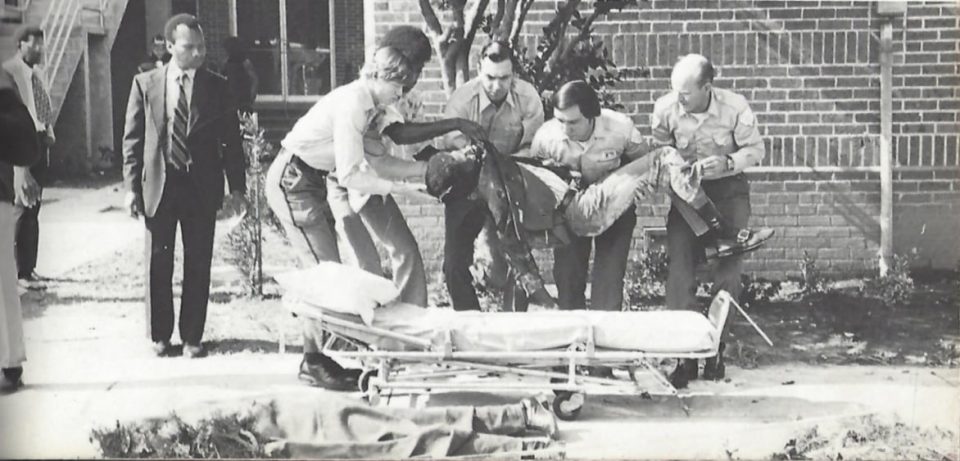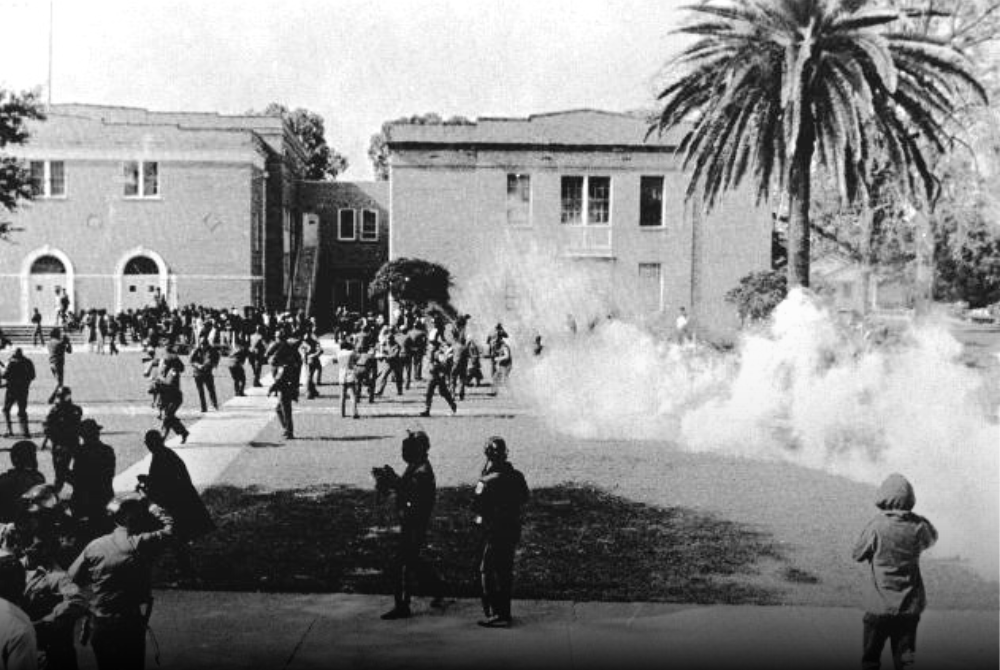PART 1: LAW PROFESSOR CALLS FOR ACCOUNTABILITY FOR MURDERED STUDENTS & BANNED STUDENTS
By C.C. Campbell-Rock
Governor John Bel Edwards apologized to Southern students last Wednesday. It came 50 years to the day that students protested and boycotted on Southern University’s Baton Rouge campus. The protest ended in arrests, the murders of two students, Denver Smith and Leonard Brown, by law enforcement officers, and a campus shutdown.
A state court banned at least nine students from the campus for life.
Edwards signed the formal proclamation in the Old State Capitol rotunda. Several of the enjoined students looked on during the 50th Anniversary of the November 16, 1972, tragedy.
In commemoration of the 50th Anniversary of the tragic day, Gov. John Bel Edwards signed a formal letter of apology to the students and their families:
“Fifty years after the senseless tragedy of November 16, 1972, when officers wielding the power and authority of the state of Louisiana unjustly killed Leonard Brown and Denver Smith, it is time to try to make amends,” said Gov. Edwards.
“In those dark times, Louisiana failed to uphold its highest ideals. And in the aftermath of that senseless tragedy, the harm to our State and to the Southern University community was exacerbated by the punishment of those students who endeavored to stand up against the unjust treatment of the Black citizens of our State. It is only right and just for the State of Louisiana, to make amends to those who were victims of injustices perpetrated by the State.”
A few weeks earlier, Southern University Law Professor Angela Allen-Bell planned the commemoration. She entitled it Cold Case: 50. She worked closely with the banned students. Thankfully Southern University administrators lifted the bans. However, students remain banned because only a court can drop the bans.
The NAACP State Conference and Professor Bell sponsored the event. Cold Case 50 is the collaboration between Professor Bell and her Civil Rights & Racism project. Also law students and the LSU Manship School of Journalism contributed to the Cold Case Project. The law students investigate unsolved murder cases.
Related: 50th Anniversary of a Campus Movement
In a video, Bell shared her perspective of the incident that affected all the students and their families. She spoke about faculty members who supported the students, student leaders, and the ongoing national student movement.
On the occasion of the 50th Anniversary of the student protest, Bell wanted to do something beyond the hashtags and symbolic gestures that occurs annually.
“Parents were left with dead students, no justification for these deaths, no answers from the school, State, FBI, or the judicial branch. We have created a system where the government continues to witness harm like this in the Black community and assumes no accountability and role as a protector of people of color in this country. Yet, the constitution guarantees that protection will occur in an instance like this.”
So, we traumatize these victims. We traumatize the community that has been on the receiving end of a message that there is no value to your life in an instance like this. There is no need to hold someone accountable when they take the innocent lives of black students. This creates distrust between people in the community and official state actors. That has yet to be addressed. I hope that on this 50th Anniversary, we do more than make this an occasion, but an opportunity to do the work of accountability, truth-telling, narrative change, and reparations.
We need action now. The department of justice has had this case open for too long. It’s a case that should have been solved and can be solved.

Bell also spoke of the false narrative about Students United. They said they were aggressive, militant, and violent.
“There has been a false narrative painted, not only in Southern’s case and across the nation about students’ protest. The students’ actions were noble, honorable, innocent, and appropriate,” Bell attested.
The students’ list of grievances bears out Bell’s contention. Students United boycotted classes and tried to negotiate in good faith with administrators to no avail. Southern University President G. Leon Netterville turned a deaf ear to students’ requests for African American studies, better housing facilities, healthier cafeteria food, sharing agricultural products and services with the Scotlandville community, Afrocentric-minded professors, and a seat at the table where decisions were made about the educational process.
Instead of working with the students, Netterville called the police to stop the students’ month-long boycott. Not only had the police been on the campus the week before the murders of Smith and Brown, but core organizers of Students United had been arrested and charged with obstructing the educational process.
On the morning of November 16, 1972, police arrested four students. So students went to meet with President Netterville and ask that he get the students out of jail.
Sheriff’s deputies and the Louisiana State police descended on the campus under the false narrative that students were holding the university president hostage. They weren’t. The police brought a military-style swat vehicle capable of shooting tear gas canisters. The students called this rig Big Bertha.
THE 50TH ANNIVERSARY OF A CAMPUS TRAGEDY
Students present that day say they couldn’t understand what the police were saying on the bullhorns. The police testified they were telling the students to disperse. When the students didn’t move from the steps of the administration building, law enforcement threw tear gas canisters at students. As students began to run, Smith and Brown fell to the ground. According to reports, Brown died at the scene, and Smith died at a hospital.
The is the first of a series of reports on -THE 50TH ANNIVERSARY OF A CAMPUS TRAGEDY
Next Week: Part 2: Students United Share Eyewitness Accounts & Impact on Their Lives


They should get compensated with cash!
Thank you, C.C., for keeping November 16, 1972 more than a day on the calendar. Your coverage of events surrounding the date helps to clarify what was actually going on at Southern University (and, I dare to say, other historically black colleges and universities). Though they may not have sensed it at the time, students who stepped up and pushed for a better institution were heroes and sheroes who would pay hefty prices for their courage, commitment and activism. May we never forget the lives of Leonard Brown and Denver Smith who paid the ultimate price for witnessing expressions of first amendment rights at the hands of armed, first amendment deniers. May we be encouraged to use every opportunity we can to be consensus builders who agitate for justice.
Thanks, Brenda,
Your modesty precedes you. Although you weren’t in the core group of organizers, you were there, among Students United. And thank you for bringing your fellow former Students United members together. Keep reading the series. Your story is included in the next installment of the series.
I agree. They should also be awarded the degrees they worked so hard for or honorary doctorates for their sacrifices and for ensuring that the Southern University system got its Board of Supervisors and a new president at that time. Keep reading to learn more about Students United’s quest for justice and a “woke” education.